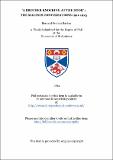Files in this item
'A brother knocking at the door' : the Malines Conversations, 1921-25
Item metadata
| dc.contributor.advisor | Lovegrove, Deryck W. | |
| dc.contributor.author | Barlow, Bernard Francis | |
| dc.coverage.spatial | 345 p. | en_US |
| dc.date.accessioned | 2018-06-13T08:27:39Z | |
| dc.date.available | 2018-06-13T08:27:39Z | |
| dc.date.issued | 1994-07 | |
| dc.identifier.uri | https://hdl.handle.net/10023/13982 | |
| dc.description.abstract | This thesis examines the history and development of the first "semi-official" face-to-face meetings between members of the Church of England and the Roman Catholic Church since the Reformation. The series of meetings were held at Malines, Belgium, under the presidency of Cardinal Mercier, and extended from 1921-1925. The initiative for these meetings came from private individuals, principally from Lord Halifax (2nd Viscount) on the Anglican side, and Abbe Fernand Portal, a French Roman Catholic priest. By involving Cardinal Mercier in these "private conversations", the participants succeeded in obtaining a guarded measure of authorization from the leadership of both Churches, from Randall Davidson, Archbishop of Canterbury, and from Pope Pius XI. When news of these Conversations at Malines eventually became public, it occasioned considerable negative reaction both from Evangelical Anglicans and the more ultramontane English Roman Catholics. The Evangelicals objected that the Anglican participants at these meetings were principally Anglo-Catholics and not representative of the whole Anglican Church, and the Roman Catholics objected to the fact that the meetings were being held on the Continent, and that English Roman Catholics had been excluded from the group of participants. The theological movements and historical conditions of the times militated against the success of these meetings, both in terms of arriving at a common and acceptable theological meeting point, and also in terms of the growing difference in organizational structures of both Churches. It was principally the enthusiasm and vision of Halifax, Portal and Mercier for preparing the groundwork of a united Christendom which provided the momentum for continued meetings. The Malines meetings in themselves did not result in any major ecumenical advance in their own time, but in several substantial ways they have initiated and contributed important elements in methodology and content to the present ecumenical work of the ARCIC Commission and in Anglican/Roman Catholic relations. | en_US |
| dc.language.iso | en | en_US |
| dc.publisher | University of St Andrews | |
| dc.subject.lcc | BX5129.B2 | en |
| dc.subject.lcsh | Malines Conversations, 1921-1925 | en |
| dc.subject.lcsh | Church of England--Relations--Catholic Church | en |
| dc.title | 'A brother knocking at the door' : the Malines Conversations, 1921-25 | en_US |
| dc.type | Thesis | en_US |
| dc.type.qualificationlevel | Doctoral | en_US |
| dc.type.qualificationname | PhD Doctor of Philosophy | en_US |
| dc.publisher.institution | The University of St Andrews | en_US |
This item appears in the following Collection(s)
Items in the St Andrews Research Repository are protected by copyright, with all rights reserved, unless otherwise indicated.

